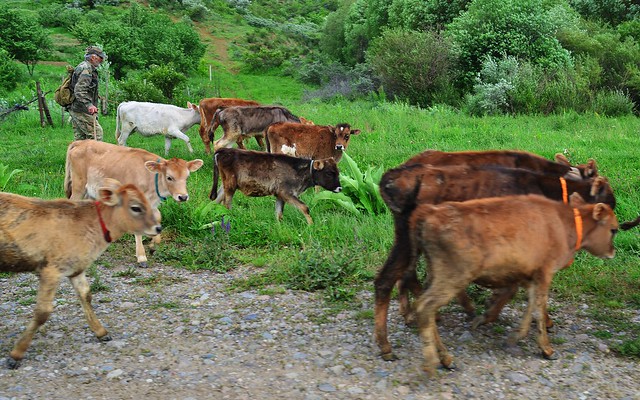Words for cowherd, boy, child and related people in Celtic languages.
| Proto-Celtic | *boukolyos = cowherd |
|---|---|
| Old Irish (Goídelc) | búachaill [ˈbuːa̯xil͈ʲ] = cowherd, herder, herdsman |
| Irish (Gaeilge) | buachaill [ˈbˠuəxɪlʲ] = boy, young unmarried; herdboy, herdsman; man-servant, male employee; lad buachailleacht = herding (cattle) |
| Scottish Gaelic (Gàidhlig) | buachaille, buachaill [buəçɪl̪ʲ(ə)] = herder, herdsman, cowherd, shepherd, youth buachailleachd [buəxɪl̪ʲəxg] = herding, watching cattle, invigilation buachailleadh [buəxɪl̪ʲəɣ] = to herd, watch cattle buachailleach [buəxɪl̪ʲəx] = pastoral |
| Manx (Gaelg) | bochilley = shepherd, herdsman bochillagh = herd, pastoral bochillaghey = to herd bochillaght = drove, herd, look after, shepherd, pastoral |
| Proto-Brythonic | *bʉgöl [bʉˈɡøːl] = herdsman |
| Middle Welsh (Kymraec) | blucelid, bukeyl, bugeil = herdsman, shepherd |
| Welsh (Cymraeg) | bugail [ˈbɪɡai̯l / ˈbiːɡai̯l] = herdsman, shepherd, guardian, keeper, leader, defender; bishop, priest, pastor, minister bugeil(i)aeth = pastoral care, shepherd’s watch, pastorate, ministry bugeilio = to shepherd, tend cattle, watch, keep guard, act as a pastor, minister bugeil(i)aidd = pastoral, pertaining to a shepherd, shepherdly, ministerial |
| Middle Cornish (Cernewec) | bugel, begel, bigel, bygel = herdsman, shepherd, pastor |
| Cornish (Kernewek) | bugel = pastor, shepherd bugeles = pastor, shepherd(ess) bugelya = to herd |
| Middle Breton | bugel, buguel, bugale = child, shepherd bugelek = childlike, childish bugelel = infantile bugelez = shepherdess, herdswoman bugeliañ = to keep, guard (animals) |
| Breton (Brezhoneg) | bugel = child |
Etymology
From the Proto-Indo-European gʷowkólos, from *gʷṓws (cow) and *kʷel- (to revolve, move around, sojourn) [source]. English words from the same roots include beef, bovine, bucolic, buffalo, butter and cow [source].
Here’s the Irish song Buachaill On Eirne (Boy from the Erne):
Here’s the Irish folk song Na Buachaillí Álainn (The Beautiful Lads):
Both songs are sung by Clannad, whose name comes from the same roots as the words below, and who get me interested in learn Irish songs and language.
| Old Irish (Goídelc) | cland [klan͈d] = children, family, offspring, plant clannmar [ˈklan͈ṽar] = prolific |
|---|---|
| Middle Irish (Gaoidhealg) | clann = plant, planting, off-shoot, produce, children, family, offspring, descendents, race, clan clannach = having many children, prolific, fruitful, productive, abundant |
| Irish (Gaeilge) | clann [kl̪ˠɑun̪ˠ/kl̪ˠɑːn̪ˠ/kl̪ˠan̪ˠ] = children, offspring, race, descendents, clan, followers, plant, lock (of hair) clannach = having many children, prolific, luxuriant clannaigh = to plant, procreate, luxuriate clannú = procreation planda [pl̪ˠaun̪ˠd̪ˠə] = plant, scion plandaigh = to plant plandáil = plantation plandóg = shapely, comely woman; young plant |
| Scottish Gaelic (Gàidhlig) | clann [kl̪ˠaun̪ˠ] = children, offspring, progeny, clan, lock of hair, curl clannail [kl̪ˠan̪ˠal] = fruitful, prolific, abounding in locks, curls, curly, shining, sleek, luxurious clanmhor [kl̪ˠãũn̪ˠvər] = fruitful, prolific plannt [pl̪ˠãũn̪ˠd] = plant |
| Manx (Gaelg) | cloan [klɔːn] = children, descendent, family circle plant = plant plantal = to plant |
| Old Welsh | plant = children, young people, offspring |
| Middle Welsh (Kymraec) | plant = children, young people, offspring |
| Welsh (Cymraeg) | plant [plant] = children, young people, offspring, progeny, descendents, followers, disciples, servants plentyn = child, young person, etc panta(f) = to beget or bear (children), procreate, breed plantaidd = childlike, innocent |
| Middle Cornish (Cernewec) | plans = plant plansa = to plant |
| Cornish (Kernewek) | plans = plant plansa = to plant, stick |
| Middle Breton | plantenn, planten, plantenn = plant, beautiful woman plantenniñ = to take root, to layer planter = planter planterez = planting |
| Breton (Brezhoneg) | plantenn = plant |
Etymology: from the Latin planta (vegetable, sprout, shoot, twig, shrub), possibly from the Proto-Indo-European *pleh₂- (flat) [source]. English words from the same roots include clan (via Irish and/or Scottish Gaelic) and plant (via Middle and Old English) [source].
Sources: Wiktionary, Am Faclair Beag, Online Manx Dictionary, Teanglann.ie, eDIL – Electronic Dictionary of the Irish Language, In Dúil Bélrai English – Old Irish glossary, Geiriadur Prifysgol Cymru, Gerlyver Kernewek, Dictionaire Favereau, TermOfis, English – ProtoCeltic WordList (PDF), Etymological Dictionary Of Proto Celtic

